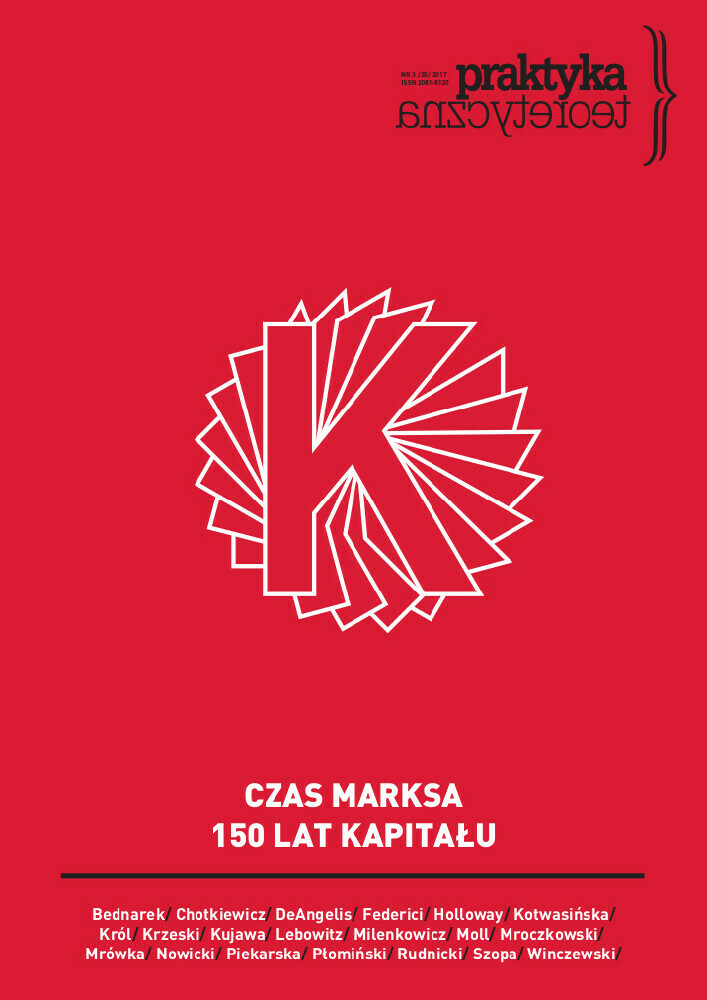Abstract
In this text I analyze Fred Moseley’s newest book Money and Totality, which tackles the infamous transformation problem. Moseley not only tries to show that Marx’s theory is quantitatively valid and that the transformation problem is in fact a pseudo-problem, but also situates it in a broader (macro-monetary) context of Marx’s whole theoretical endeavor.References
Bellofiore, Riccardo. 2004. „Marx and the macro-monetary foundation of microeconomics.” W The Constitution of Capital. Red. Nicola Taylor, Riccardo Bellofiore. London: Palgrave Macmillan.
Böhm-Bawerk, Eugen. 1949. „Karl Marx and the Close of His System.” W Karl Marx and the Close of His System. Red. Augustus M. Kelly. New York: Clifton.
Bortkiewicz, Władysław. 1949. „On the correction of Marxʼs Fundamental Theoretical Construction in The Third Volume of Capital.” W Karl Marx and the Close of His System. Red. Augustus M. Kelly. New York: Clifton.
Fine, Ben, Costas Lapavitsas i Alfredo Saad-Filho. 2004. „Transforming the Transformation Problem: Why the »New Interpretation« Is a Wrong Turning.” Review of Radical Political Economics 36 (1): 3–19.
Foley, Duncan K. 1982. „ The Value of Money the Value of Labor Power and the Marxian Transformation Problem.” Review of Radical Political Economics 14 (2): 37–47.
Foley, Duncan K. 1986. Understanding Capital. Cambridge MA: Harvard University Press.
Grossman, Henryk. 1992. Law of Accumulation and Breakdown of the Capitalist System. London: Pluto Press.
Heinrich, Michael. 1989. „Capital in General and the Structure of Marx’s Capital.” Capital & Class 13 (2): 63–79.
Kliman, Andrew J. i Ted McGlone. 1999. „A temporal single-system interpretation of Marx’s value theory.” Review of Political Economy 11 (1): 33–59.
Kliman, Andrew. 2007. Reclaiming Marx’s Capital: A Refutation of the Myth of Inconsistency. Lanham: Lexington Books.
Marks, Karol. 1957. Kapitał. Krytyka Ekonomii Politycznej. T. III. Tłum. zbiorowe. Warszawa: Książka i Wiedza.
Marks, Karol. 1968. „Kapitał. Krytyka ekonomii politycznej. T. I. Proces wytwarzania kapitału”. W Karol Marks i Fryderyk Engels. Dzieła. Tom 23. Tłum. zbiorowe. Warszawa: Książka i Wiedza.
Mattick, Paul. 1969. Marx and Keynes. Boston: Porter Sargent Boston.
Morishima, Michio. 1973. Marx’s Economics A Dual Theory of Value and Growth. Cambridge: Cambridge University Press.
Moseley, Fred. 1997. Abstract labor: substance or form? A critique of the value-form interpretation of Marx's Theory. https://www.mtholyoke.edu/~fmoseley/Working_Papers_PDF/VALUEFRM.pdf [dostęp: 13.09.2017].
Moseley, Fred. 2005. „Money Has No Price: Marx’s Theory of Money and the Transformation Problem.” W Marx’s Theory of Money. Red. Fred Moseley. London: Palgrave Macmillan.
Moseley, Fred. 2011. „The Determination of the »Monetary Expression of Labor Time« (»MELT«) in the Case of Non-Commodity Money.” Review of Radical Political Economics 43 (1): 95–105.
Moseley, Fred. 2016. Money and Totality: Marx’s Logical Method in „Capital” and the End of the „Transformation Problem”. Leiden: Brill.
Nowak-Posadzy, Krzysztof. 2015. „Jaką teorią jest Marksowska teoria wartości opartej na pracy?”. Praktyka Teoretyczna 1(15): 15–56.
Rosdolsky, Roman. 1977. The Making of Marx’s Capital Volume 2. London: Pluto Books.
Rubin, Izaak. 1928 [1975]. Essays on Marx’s Theory of Value. Montreal: Black Rose.
Saad-Filho, Alfredo. 1997. „An alternative reading of the transformation of values into prices of production.” Capital & Class 21 (3): 115–136.
Samuelson, Paul A. 1971. „Understanding the Marxian Notion of Exploitation: A Summary of the so-Called Transformation Problem between Marxian Values and Competitive Prices.” Journal of Economic Literature 9 (2): 399–431.
Steedman, Ian. 1977. Marx after Sraffa. London: New Left Books.
License
“Theoretical Practice” seeks to put into practice the idea of open access to knowledge and broadening the domain of the commons. It serves the development of science, thinking and critical reflection. The journal is published in open-access mode under the CC-BY-NC-SA 4.0 license (detail available here: http://creativecommons.org/licenses/by-nc-sa/4.0/). Articles published in the journal may be freely distributed, stored, printed and utilized for academic and teaching purposes without restrictions.
They should not be, however, used for any commercial purposes or be reconstructed into derivative creations. Access to the journal may not be limited or offered for a fee by any third party.
Prospective authors are obliged to fill in, sign and send back the publishing contract compliant with the CC licencing. [PL.pdf, PL.doc, EN.pdf,EN.doc].
According to this contract, authors grant the journal a non-exclusive right to publish their work under the creative commons license (CC-BY-NC-SA 4.0) without any financial obligation on both sides of the contract.
Before submission authors should make sure that derivative materials they use are not protected by copyright preventing their non-commercial publication. Authors are responsible for any respective copyright violations.
